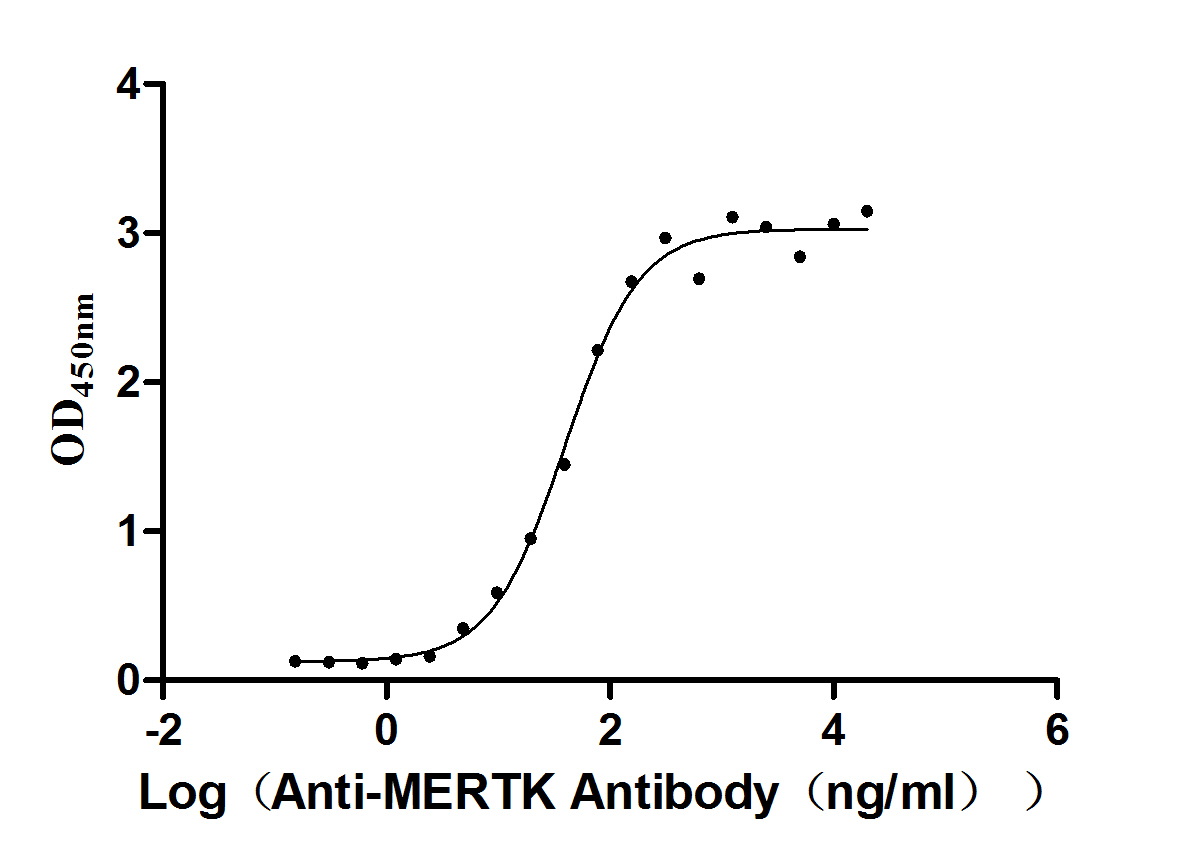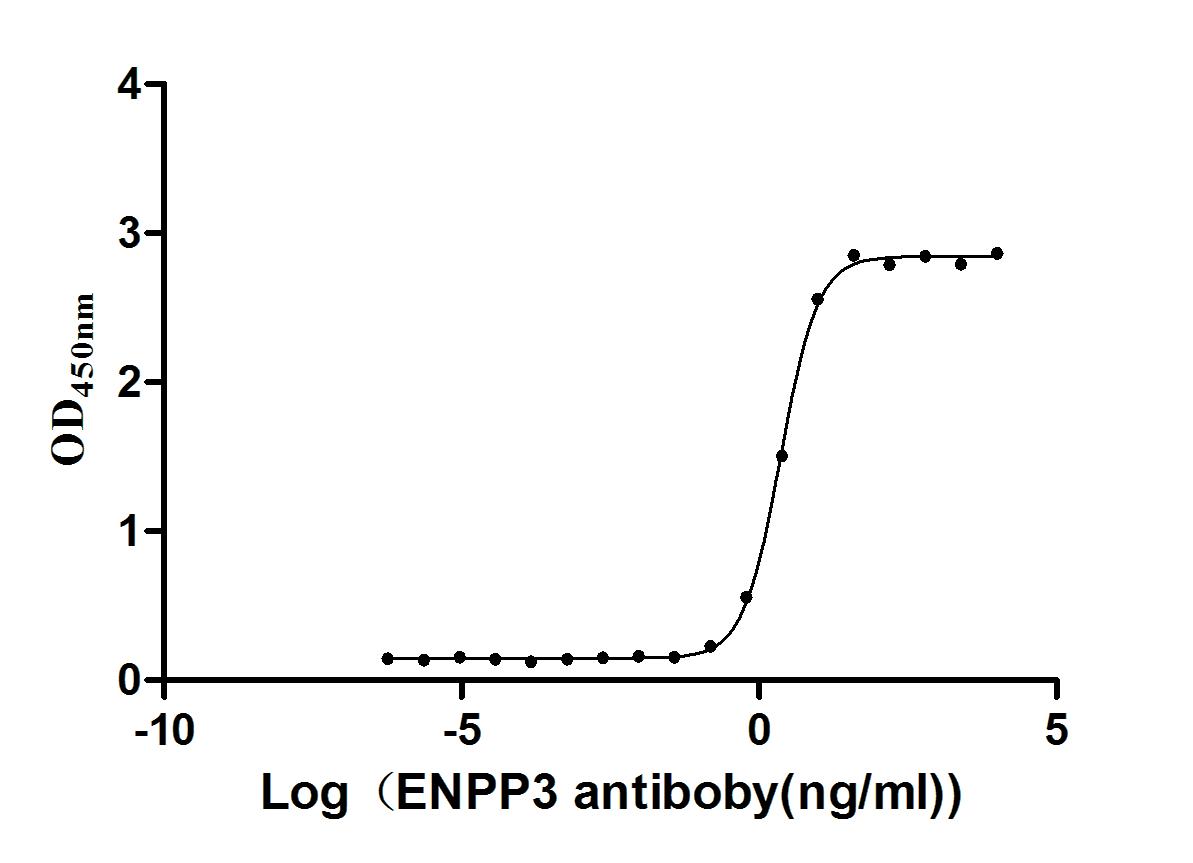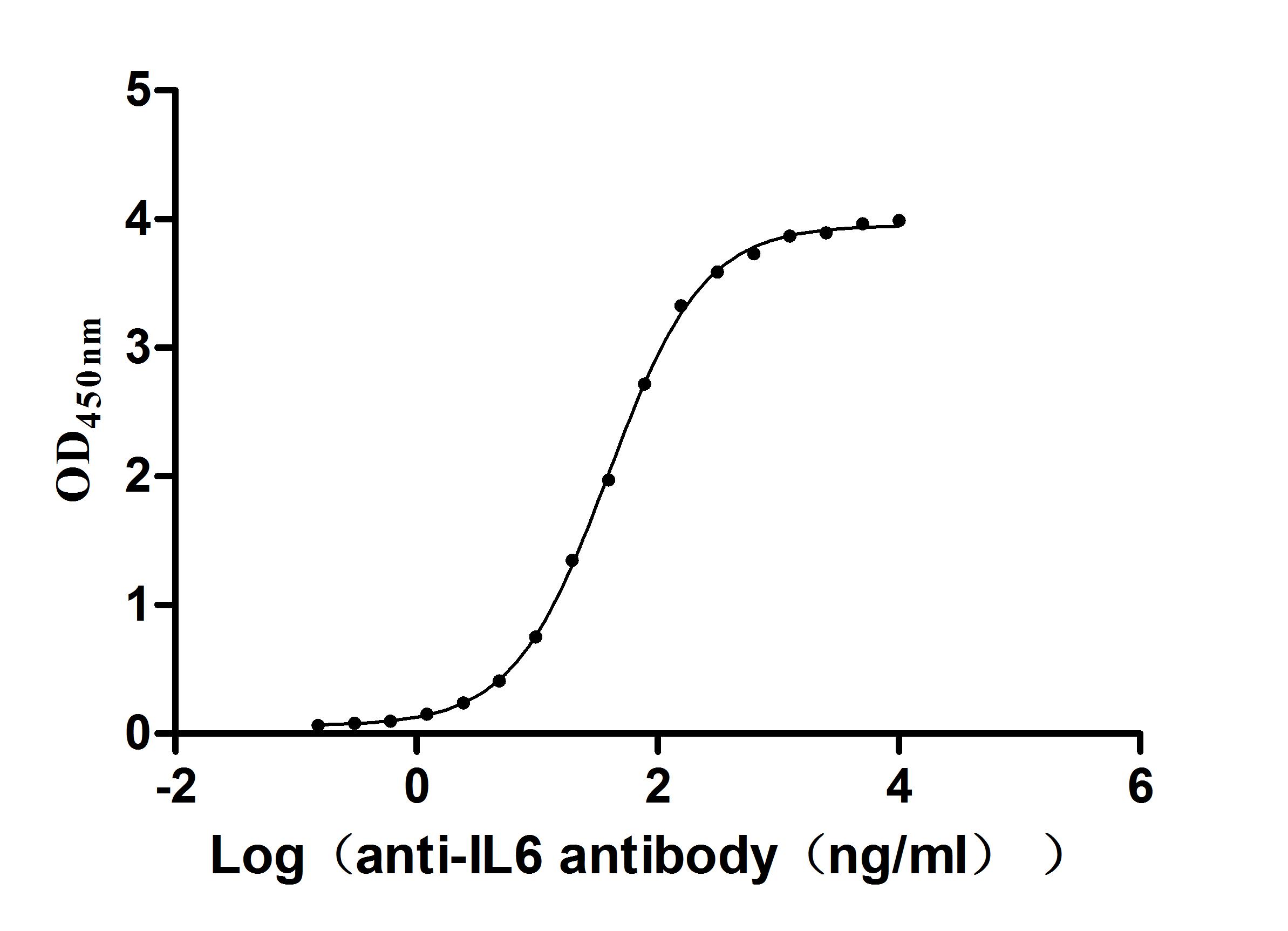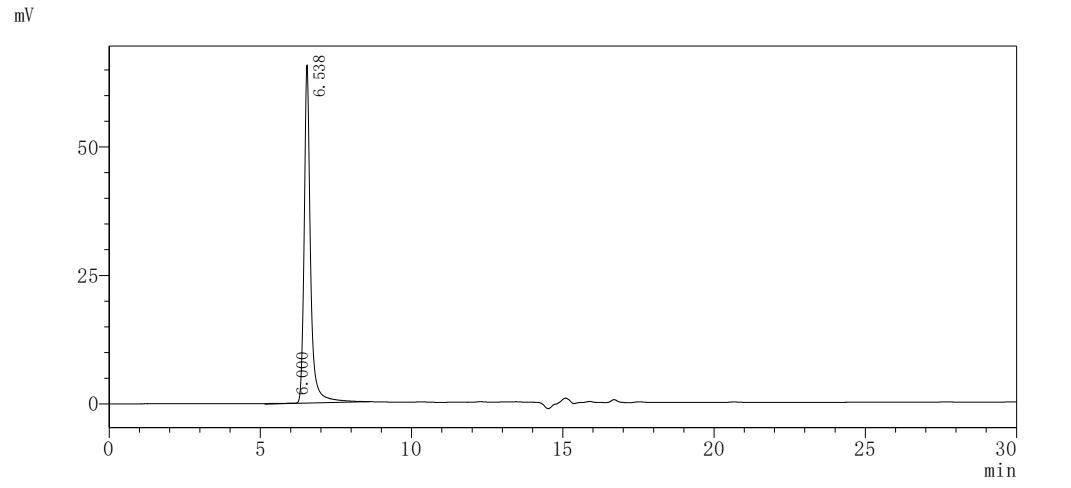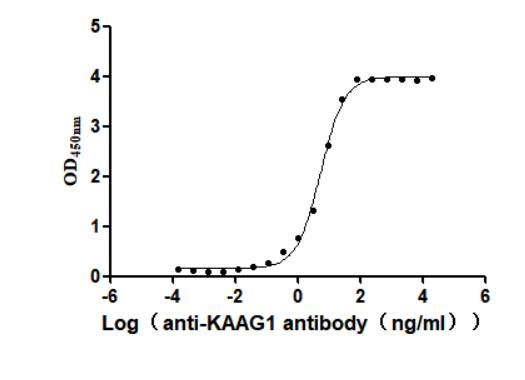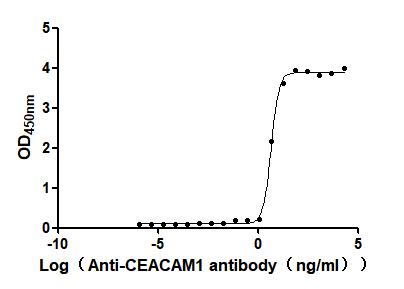Recombinant Human Pejvakin (PJVK)
-
货号:CSB-YP607322HU
-
规格:
-
来源:Yeast
-
其他:
-
货号:CSB-EP607322HU
-
规格:
-
来源:E.coli
-
其他:
-
货号:CSB-EP607322HU-B
-
规格:
-
来源:E.coli
-
共轭:Avi-tag Biotinylated
E. coli biotin ligase (BirA) is highly specific in covalently attaching biotin to the 15 amino acid AviTag peptide. This recombinant protein was biotinylated in vivo by AviTag-BirA technology, which method is BriA catalyzes amide linkage between the biotin and the specific lysine of the AviTag.
-
其他:
-
货号:CSB-BP607322HU
-
规格:
-
来源:Baculovirus
-
其他:
-
货号:CSB-MP607322HU
-
规格:
-
来源:Mammalian cell
-
其他:
产品详情
-
纯度:>85% (SDS-PAGE)
-
基因名:PJVK
-
Uniprot No.:
-
别名:Autosomal recessive deafness type 59 protein; DFNB59; DFNB59 deafness; autosomal recessive 59; Pejvakin; PJVK ; PJVK_HUMAN
-
种属:Homo sapiens (Human)
-
蛋白长度:full length protein
-
表达区域:1-352
-
氨基酸序列MFAAATKSFV KQVGDGGRLV PVPSLSEADK YQPLSLVVKK KRCFLFPRYK FTSTPFTLKD ILLGDREISA GISSYQLLNY EDESDVSLYG RRGNHIVNDV GINVAGSDSI AVKASFGIVT KHEVEVSTLL KEITTRKINF DHSLIRQSRS SRKAVLCVVM ESIRTTRQCS LSVHAGIRGE AMRFHFMDEQ NPKGRDKAIV FPAHTTIAFS VFELFIYLDG AFDLCVTSVS KGGFEREETA TFALLYRLRN ILFERNRRVM DVISRSQLYL DDLFSDYYDK PLSMTDISLK EGTHIRVNLL NHNIPKGPCI LCGMGNFKRE TVYGCFQCSV DGQKYVRLHA VPCFDIWHKR MK
-
蛋白标签:Tag type will be determined during the manufacturing process.
The tag type will be determined during production process. If you have specified tag type, please tell us and we will develop the specified tag preferentially. -
产品提供形式:Lyophilized powder
Note: We will preferentially ship the format that we have in stock, however, if you have any special requirement for the format, please remark your requirement when placing the order, we will prepare according to your demand. -
复溶:We recommend that this vial be briefly centrifuged prior to opening to bring the contents to the bottom. Please reconstitute protein in deionized sterile water to a concentration of 0.1-1.0 mg/mL.We recommend to add 5-50% of glycerol (final concentration) and aliquot for long-term storage at -20℃/-80℃. Our default final concentration of glycerol is 50%. Customers could use it as reference.
-
储存条件:Store at -20°C/-80°C upon receipt, aliquoting is necessary for mutiple use. Avoid repeated freeze-thaw cycles.
-
保质期:The shelf life is related to many factors, storage state, buffer ingredients, storage temperature and the stability of the protein itself.
Generally, the shelf life of liquid form is 6 months at -20°C/-80°C. The shelf life of lyophilized form is 12 months at -20°C/-80°C. -
货期:Delivery time may differ from different purchasing way or location, please kindly consult your local distributors for specific delivery time.Note: All of our proteins are default shipped with normal blue ice packs, if you request to ship with dry ice, please communicate with us in advance and extra fees will be charged.
-
注意事项:Repeated freezing and thawing is not recommended. Store working aliquots at 4°C for up to one week.
-
Datasheet :Please contact us to get it.
靶点详情
-
功能:Peroxisome-associated protein required to protect auditory hair cells against noise-induced damage. Acts by regulating noise-induced peroxisome proliferation in auditory hair cells and neurons, and promoting autophagic degradation of damaged peroxisomes (pexophagy). Noise overexposure increases reactive oxygen species (ROS) levels, causing oxidative damage to auditory hair cells and resulting in hearing loss. PJVK acts as a ROS sensor that recruits the autophagy machinery to trigger pexophagy of peroxisomes damaged by oxidative stress. In addition to pexophagy, also required to promote peroxisome proliferation in response to sound overstimulation.
-
基因功能参考文献:
- We identified in Moroccan deaf patients two mutations in PJVK and one mutation in MYO15A described for the first time in association with non-syndromic recessive hearing loss PMID: 28964305
- Study describes a genetic form of noise-induced hearing loss , by showing that pejvakin deficiency in mice and DFNB59 patients leads to hypervulnerability to sound, due to a peroxisomal deficiency. PMID: 26544938
- p.C312W fsX19 mutation causative of autosomal recessive, non-syndromic, prelingual sensorineural hearing impairment PMID: 25631766
- PCDH15 or DFNB59 variants are associated with poor CI performance, yet children with PCDH15 or DFNB59 variants might show clinical features indistinguishable from those of other typical pediatric cochlear implant recipients. PMID: 26166082
- a c.406C>T (p.R136X) nonsense mutation in the DFNB59 gene hearing loss in an isolated Arab population PMID: 21696384
- Missense mutation in PJVK causes progressive hearing loss. PMID: 22617256
- OTOF and PJVK gene variants have a role in auditory neuropathy spectrum disorder in Chinese patients PMID: 21935370
- failed to detect the presence either of mutations T54I and R183W in the exon 2 and exon 4 or any other deafness-associated mutations in the whole DFNB59 gene in this family PMID: 19160860
- Observational study of gene-disease association. (HuGE Navigator) PMID: 19913121
- Observational study of gene-disease association, gene-environment interaction, and pharmacogenomic / toxicogenomic. (HuGE Navigator) PMID: 20628086
- Observational study of genotype prevalence. (HuGE Navigator) PMID: 20739942
- DFNB59, a newly identified gene on chromosome 2q31.1-q31.3 mutated in four families segregating autosomal recessive auditory neuropathy PMID: 16804542
- We have identified a consanguineous family segregating autosomal recessive congenital progressive hearing loss (ARNSHL) and retinal degeneration with central vestibular dysfunction having homozygosity for a DFNB59 mutation. PMID: 17301963
- data indicate that nonsense mutations in DFNB59 cause nonsyndromic hearing loss, but that mutations in DFNB59 are not a major cause of nonsyndromic hearing impairment in the Turkish and Dutch population PMID: 17373699
- Mutations in DFNB59 are associated with autosomal recessive non-syndromic hearing loss in about 6.7% of GJB2-negative families. PMID: 17718865
显示更多
收起更多
-
相关疾病:Deafness, autosomal recessive, 59 (DFNB59)
-
亚细胞定位:Peroxisome membrane. Cell projection, cilium.
-
蛋白家族:Gasdermin family
-
数据库链接:
HGNC: 29502
OMIM: 610219
KEGG: hsa:494513
STRING: 9606.ENSP00000364271
UniGene: Hs.87734
Most popular with customers
-
Recombinant Human Tyrosine-protein kinase Mer (MERTK), partial (Active)
Express system: Mammalian cell
Species: Homo sapiens (Human)
-
Express system: Mammalian cell
Species: Homo sapiens (Human)
-
-
Recombinant Human C-C chemokine receptor type 9 (CCR9)-VLPs (Active)
Express system: Mammalian cell
Species: Homo sapiens (Human)
-
Recombinant Human Kidney-associated antigen 1(KAAG1) (Active)
Express system: Baculovirus
Species: Homo sapiens (Human)
-
Express system: Mammalian cell
Species: Homo sapiens (Human)
-
Recombinant DT3C (Diphtheria toxin & spg 3C domain) for Antibody Internalization Assay (Active)
Express system: E.coli
Species: N/A


